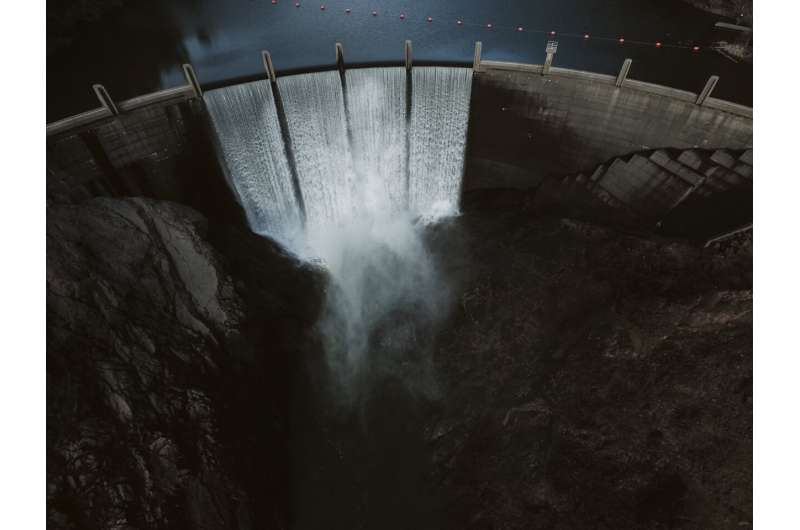This article has been reviewed according to Science X's editorial process and policies. Editors have highlighted the following attributes while ensuring the content's credibility:
fact-checked
trusted source
proofread
Dam infrastructure worldwide 'not ready' to meet the demands of a changing climate, expert says

Thousands of people have been killed and another 10,000 are missing—and presumed dead—in Libya after flooding from a devastating Mediterranean storm over the weekend swept away homes and inundated roadways, leading to a humanitarian crisis of "catastrophic" proportions.
The coastal city of Derna suffered most of the catastrophic flooding from Storm Daniel after two catchment dams burst, unleashing floodwaters that swept away whole neighborhoods, imperiling thousands of residents in a region already steeped in years of conflict.
The unprecedented disaster comes on the heels of another tragedy in the North African nation of Morocco, where an earthquake on Friday killed more than 2,900 people.
Auroop Ganguly, Northeastern's distinguished professor of civil and environmental engineering, described the floods in Libya as a "gray swan" event—that is, an event that is rare but predictable. Such events include COVID-19 pandemic, Hurricane Katrina and the 2008 financial collapse, for example—and are contrasted with "black swan" events, such as the Sept. 11 attacks.
The gray swan is what experts describe as a "predictive surprise;" they wreak devastation on the affected communities, but point to longstanding deficiencies in "infrastructure readiness and resilience."
Often, the lessons from these events are not learned, Ganguly says.
"The idea here is that there are some events which are so drastically divergent from our expectations and anticipations that they cannot be predicted by any means," he says. "But they do have significant and wide-ranging long-term impacts. That's a black swan."
On the gray swan, Ganguly adds, "Statistically, we might be able to say these kinds of events are more likely, but the surprise element is that we can't exactly pinpoint where, when and to what intensity they'll take place."
Citing several past disasters—the levee failures in New Orleans during Hurricane Katrina, the recent floods in Pakistan—Ganguly says that, even in the aftermath of such catastrophes, "there is often a lack of incentives to invest in greater resilience."
"The infrastructure has to be ready for these sorts of events," he says. "If you're thinking about, for example, long-term climate variability and change—that should impact the design of hydraulic infrastructure, and the design of dams and reservoirs."
Ganguly, whose work has focused on data-driven analyses of water, weather and climate systems, says it's a problem with dam operators worldwide.
"The underlying trigger is the fact that the dams and the hydraulic infrastructure—and this is true in many parts of the world—were not ready in the long term, in terms of design considerations, nor in the shorter term, in terms of consequence management," Ganguly says.
That's because much of the physical infrastructure in the developing world—but also in the West—is built according to a cost-effective analysis that doesn't factor in the more extreme weather events brought on by climate change, says Daniel Aldrich, a Northeastern professor, director of the university's Security and Resilience Program and co-director at the Global Resilience Institute.
"What we're seeing is absolutely a consequence of the way we prioritize investments in different types of systems," Aldrich says. "When we built these dams, we certainly didn't have in mind the irregularities we're seeing more often."
Aldrich described the floods as an example of a "polycrisis," a confluence of simultaneous events that coalesce into a "perfect storm."
"Think of the fact that all of our physical infrastructure is built to, in a sense, be effective along one axis," Aldrich says, "and it doesn't really take into account the consequences of carbon dioxide in the air. We make infrastructure to be economically efficient, not resilient."
Provided by Northeastern University




















